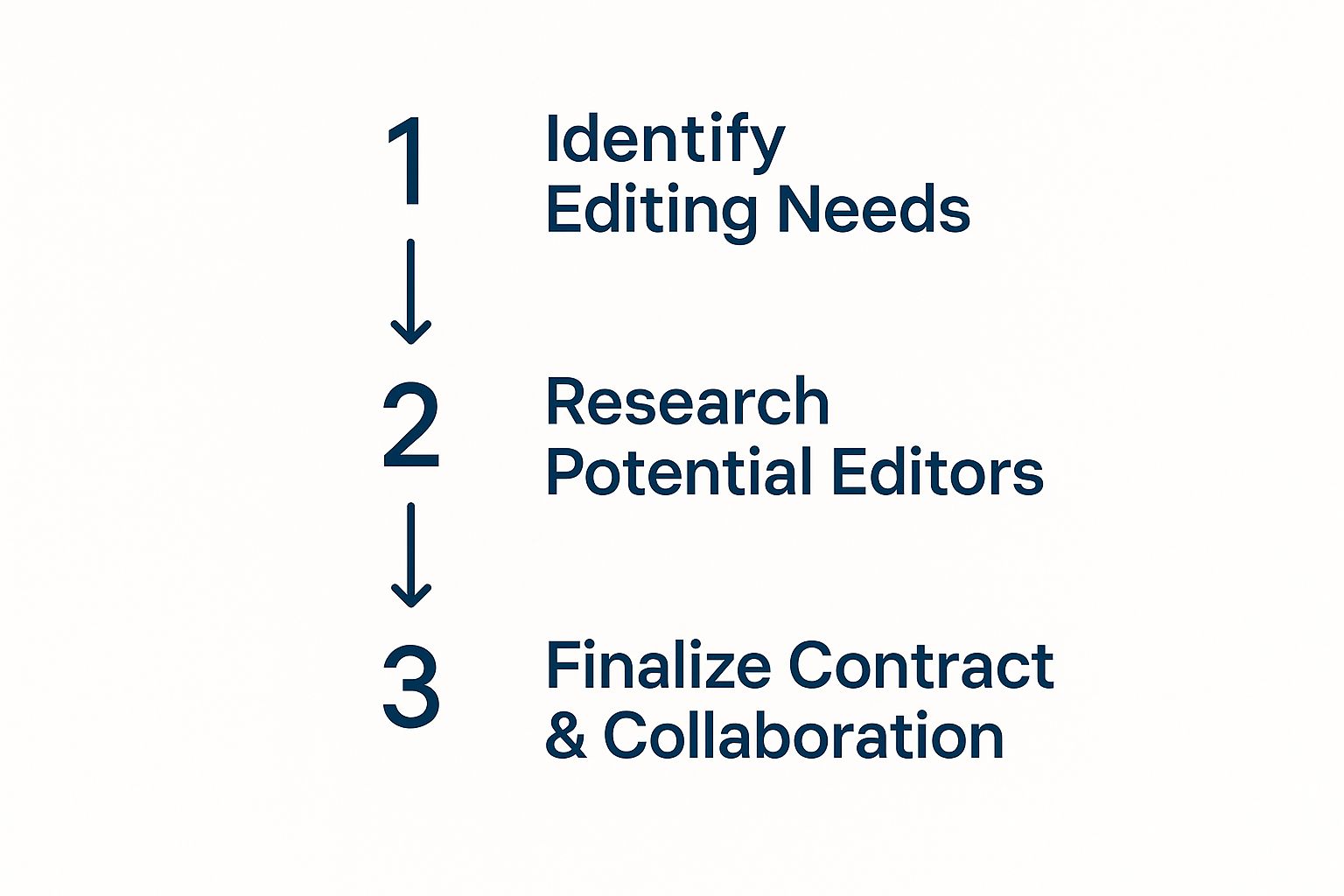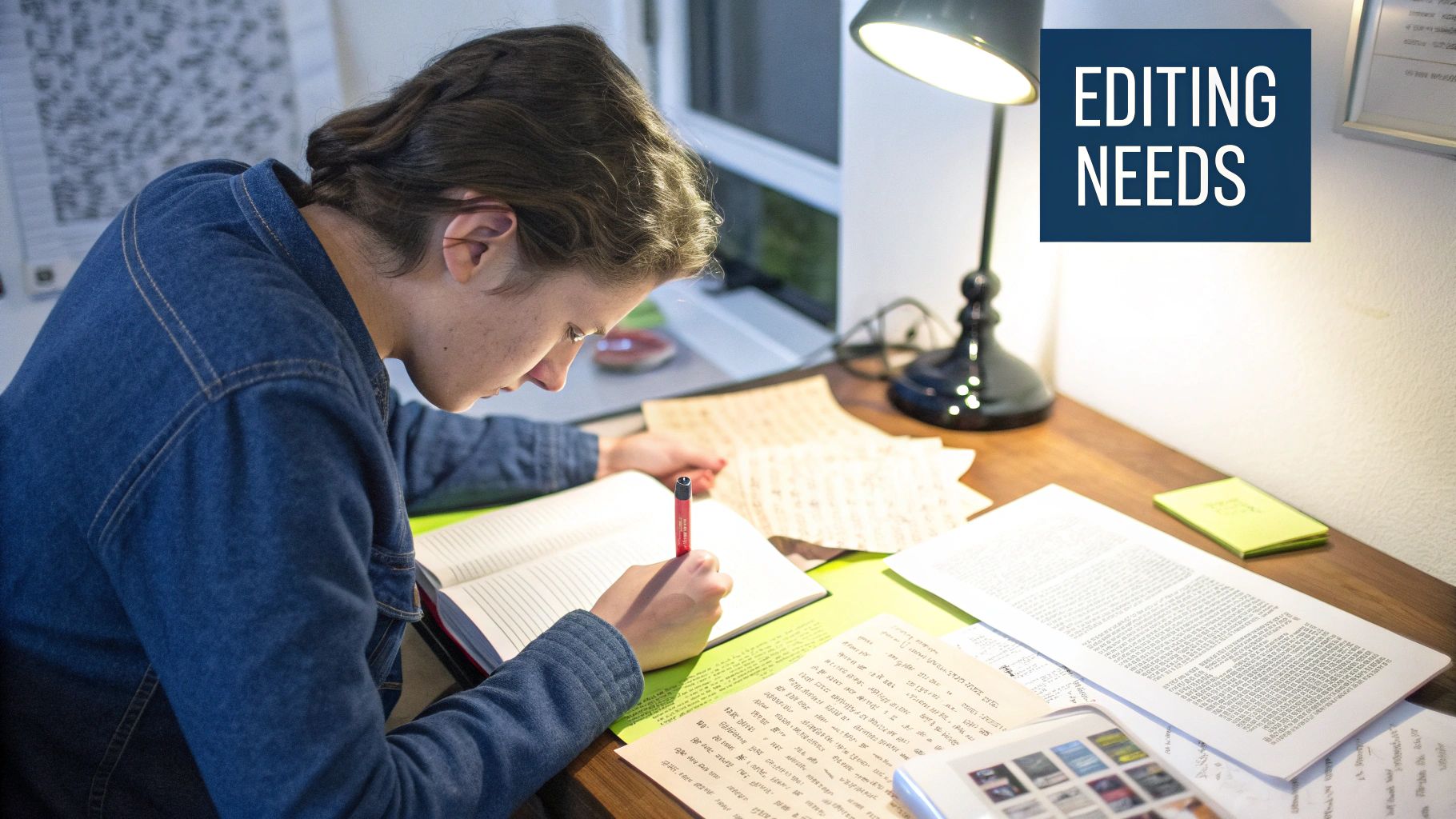Before you even type "how to find a book editor" into a search bar, let's pause. The single most important step happens before you start looking. You need to figure out what your manuscript actually needs right now.
Getting this right from the start saves a ton of time, money, and heartache. It's all about matching the current state of your book with the right kind of editorial help. This starts with an honest look at your work to determine if you need major surgery on the story or just a final polish on the sentences.
Matching Your Manuscript to the Right Editor
Jumping into the search without knowing what you need is like showing up at the emergency room and just saying "I'm sick." You wouldn't hire a heart surgeon for a broken bone, right? In the same way, hiring a proofreader when your plot has gaping holes is a complete waste of everyone's time and your hard-earned cash.
The goal is to find a partner who is perfectly suited to help with your book’s specific challenges at this exact moment. To do that, you first need to understand the different kinds of editors and what they actually do. Each type focuses on a very different part of your manuscript, from the fundamental story structure all the way down to the final comma.
Diagnosing Your Manuscript's Needs
Time for a little self-assessment. Be honest with yourself and ask some tough questions about your manuscript.
Does the plot feel confusing? Are your characters' motivations a bit fuzzy? If you're nodding along, you’re probably looking for a developmental editor. These are the big-picture experts who look at things like pacing, character arcs, and the overall structure of your story.
Maybe your story is solid, but the writing itself feels clunky or your authorial voice isn't quite shining through. That's a job for a line editor. They work at the sentence and paragraph level, focusing on rhythm, flow, clarity, and style.
If the prose is already strong but you know there are probably some grammar mistakes, spelling errors, or consistency issues lurking, a copyeditor is who you need. And for that final, last-chance review to catch any lingering typos right before you hit "publish"? That's what a proofreader is for.
The best author-editor relationships I've ever seen started with the author knowing exactly what they needed. A writer who can say, "My plot hangs together, but my dialogue is just flat," is already halfway to finding the perfect editorial partner.
This visual lays out the entire journey, from figuring out what you need to working with your chosen editor.

As you can see, identifying your needs is the bedrock. Everything else in your search is built on that foundation.
Which Type of Book Editor Do You Need?
To make it even clearer, I've put together a table breaking down the four main types of editing. Use this to pinpoint exactly where your manuscript is in its journey and who can best help you take the next step.
| Type of Editing | Primary Focus | Best For Manuscripts That… | Typical Cost Range |
|---|---|---|---|
| Developmental Editing | Big-picture story elements: plot, pacing, character arcs, structure, theme. | Are in an early draft and need help with the fundamental story. The plot may have holes or characters feel underdeveloped. | $0.07–$0.12 per word |
| Line Editing | Prose, style, and voice: sentence flow, rhythm, clarity, word choice, and tone. | Have a solid structure but the writing feels clunky, repetitive, or lacks a distinctive voice. | $0.04–$0.06 per word |
| Copyediting | Technical correctness: grammar, spelling, punctuation, syntax, and consistency. | Are well-written and structurally sound but need a thorough check for technical errors and consistency. | $0.02–$0.04 per word |
| Proofreading | Final quality control: catching typos, formatting errors, and minor mistakes before publication. | Have already been copyedited and designed. This is the very last check for any errors missed in previous stages. | $0.015–$0.02 per word |
Choosing the right type of editor isn't just a suggestion—it's the most critical decision you'll make in this process. It sets the stage for a productive partnership and a much stronger final book.
The demand for these specialized skills is absolutely booming, thanks in large part to the explosion of self-publishing. The global book editing services market was valued at around $271 million in 2025 and is only expected to climb. This just goes to show how vital a professionally edited manuscript is in a crowded market.
When you start your search, look for an editor with experience in your genre or style. Their familiarity is a huge asset, so it pays for you to be clear on your own work by understanding diverse forms of written content, such as feature articles, to find the best possible match.
Where to Find Vetted Professional Book Editors

Alright, so you know what kind of editor you need. That’s a huge first step. But where do you actually find these pros? A simple Google search can throw a million results at you, and it's easy to get overwhelmed.
The key is to look in the right places from the start. Your mission isn't just to find any editor; it's to find your editor—someone who gets your genre, your voice, and your vision. Let's look at the most reliable spots to start building your shortlist.
Curated Marketplaces and Professional Directories
The most straightforward way to connect with professional editors is through established online platforms. Think of these as dedicated hubs where freelance editors showcase their work, letting you easily browse portfolios, check experience, and read reviews from other authors.
Two of the best starting points are:
- Curated Marketplaces: I often point authors toward sites like Reedsy. They pre-vet every editor on their platform, which gives you a built-in layer of quality control. You know everyone has met a certain standard of professionalism and experience. You can filter by genre, service, and even keywords to really zero in on the right fit.
- Professional Associations: Organizations like the Editorial Freelancers Association (EFA) are goldmines. They have massive directories of their members. While it's less of a guided experience than a marketplace, the EFA directory gives you access to an enormous pool of talent. You can even post a job description and let interested editors come to you.
I'd say marketplaces are like a guided tour, while directories are more like an open library for you to explore. Both are fantastic ways to find qualified candidates.
When you're browsing these platforms, look for specificity. An editor who has worked on several "cozy mystery" novels is going to be a much better match for your cozy mystery than someone who just lists "fiction." That deep, nuanced understanding of a subgenre can make all the difference.
Uncovering Editors Through Creative Research
Beyond the big databases, some of the absolute best editors are found through more old-fashioned detective work. These tactics take a bit more legwork, but they can connect you with an incredible editor who might not be advertising on the major platforms.
Here’s one of my favorite insider tricks: go to your bookshelf.
Pick up a few of your favorite books, especially ones published recently in your genre. Flip to the acknowledgments page. Nearly every author thanks their editor by name. Jot that name down, do a quick search, and you'll likely find their professional website or LinkedIn profile. Just like that, you have a direct line to an editor whose work you already know and admire.
Don't forget the power of community, either. Join author groups on Facebook or dedicated forums like Scribophile or Absolute Write. These places are treasure troves of real-world advice. Simply asking, "Can anyone recommend a great developmental editor for an epic fantasy?" will get you candid, firsthand recommendations you won't find anywhere else.
Building these connections is invaluable, not just for finding an editor, but also for when you start figuring out how to find a book publisher down the road.
How to Vet Editors and Find the Perfect Match

Alright, you’ve got your shortlist of potential editors. This is where the real work begins. You're about to move from a list of names to finding that one person who truly gets your story and your vision. Honestly, this is the most important part of the entire process.
It’s easy to get star-struck by an impressive resume, but a great editor is so much more than their credentials. You're looking for a partner. That means digging into their technical skill, sure, but also their communication style and whether they can vibe with your unique authorial voice.
Analyzing Portfolios and Testimonials
First thing's first: dive deep into each editor's professional footprint. A solid portfolio is your initial clue, but don't just glance at the pretty book covers. You're looking for patterns.
- Genre Fit: Do they live and breathe your genre? Someone who specializes in lyrical historical romance probably isn't the best fit for your gritty, hard sci-fi novel. Their instincts will be tuned differently.
- Quality of Past Projects: Look up the books they’ve actually edited. Check out their reviews on Amazon or Goodreads. Are they polished and professional? This is a direct reflection of the quality they bring to the table.
- Real-World Testimonials: You need to read between the lines here. Vague praise like "they were great to work with" is nice, but it doesn't tell you much. Look for the specifics. Comments like, "She helped me finally untangle my messy third act," or "He pushed me to find the emotional core of my main character," are pure gold.
These details give you a window into how they work and the results you can expect. It helps you start to picture what it would actually feel like to collaborate with them.
The Non-Negotiable Sample Edit
You wouldn't buy a car without a test drive, right? The same logic applies here. A sample edit is an absolute must. Most professional editors will offer a free or paid sample edit of 1,000 to 5,000 words.
If an editor refuses to do one? That's a major red flag. Politely move on. A sample is the only way to see their skills in action on your writing.
When you send it over, pick a section that really represents your manuscript—give them a mix of dialogue, action, and description to chew on. When you get the samples back, you aren't just looking for corrected typos.
The real goal of a sample edit isn't just seeing what an editor changes. It’s about understanding why they made those changes and whether their feedback clicks with your vision for the book.
What to Look For in the Edit
Once the samples are in your inbox, it's time to compare them. I find it helpful to create a simple checklist to keep things objective.
- Depth of Feedback: Did they only fix commas, or did they leave insightful comments in the margins about character motivation, pacing, or a clunky line of dialogue?
- Voice Preservation: After their edits, does it still sound like you? A great editor makes your voice stronger and clearer; they don't replace it with their own.
- Communication Style: Was the feedback constructive and respectful? You’re looking for a collaborator who will build you up, not a drill sergeant who will tear you down.
- The Big Picture: For developmental edits, did they include a short editorial letter explaining their overall thoughts? This shows they can see the forest for the trees.
This evaluation is where you’ll find your person. It’s that "aha!" moment when an editor’s feedback not only makes perfect sense but gets you excited to dive back into your own story. Taking the time here ensures your investment pays off, which is critical. With the global book market revenue projected to hit $142.72 billion in 2025, your book needs every advantage it can get.
Once you find that perfect match, you’ll need to talk terms. Before signing any contracts, make sure you understand the financial side of things by reviewing a guide on how much book editing costs.
Navigating Editorial Costs and Contracts
Alright, let's get down to the brass tacks: money and agreements. You've found an editor who gets your vision, which is fantastic. Now comes the part that can feel a little daunting—the quote and the contract.
Don't let this stage trip you up. A professional editor will always provide a clear, easy-to-understand agreement. It’s not just a formality; it’s the blueprint for a solid working relationship, making sure you both know exactly what to expect.
Decoding Editorial Rates
First things first, you'll notice editors charge in a few different ways. There’s no single industry standard, so you’ll likely come across one of these common models.
- Per-Word Rates: This is the most common structure for line editing, copyediting, and proofreading. It's wonderfully simple: you pay a set amount for each word in your manuscript.
- Hourly Rates: You'll often see this for developmental editing or for projects where the work required is a bit of a moving target. The editor bills for the time they actually spend shaping your story.
- Flat-Rate Projects: Many editors prefer to quote a single, all-in price for the entire job. I personally like this for authors because it gives you budget certainty right from the start. No surprises.
If an editor's quote seems wildly different from others, ask them about their pricing model. A good pro will have no problem explaining their reasoning, and their answer often reveals a lot about their process.
A word of caution: if a quote seems too good to be true, it probably is. An unusually low price can be a red flag for inexperience or a sign that the editor has underestimated the work involved. A fair price reflects deep expertise and the dedicated time your book deserves.
Key Components of an Editorial Contract
Think of the editorial agreement as your best friend in this process. It’s there to protect both you and the editor by spelling everything out, leaving no room for crossed wires.
Here’s what you should always look for in a solid contract:
- Scope of Work: This needs to be crystal clear. It should detail exactly what the editor will do (e.g., "one pass of copyediting focused on grammar, syntax, and consistency") and, just as importantly, what they won't do.
- Deliverables: What are you actually getting back? Typically, this is your manuscript returned as a Microsoft Word file with Track Changes on, plus a separate editorial letter or a style sheet.
- Timeline and Deadlines: The contract must lock in a start date, the final return date for the edited manuscript, and any important checkpoints along the way.
- Payment Schedule: This breaks down the cost and timing. A 50% deposit to secure your spot on their calendar, with the final 50% due upon completion, is a very common and fair arrangement.
- Revision and Kill Fee Clauses: What’s the plan if you decide you need another round of edits? What happens if, for some reason, one of you needs to end the project early? These clauses provide a clear path forward for an unlikely, but possible, scenario.
It's also worth noting how market trends can subtly influence your editorial needs. For example, recent industry reports noted a 19.8% jump in hardback sales while other formats saw a dip. This might mean you'll want an editor experienced with the nuances of preparing a manuscript for a premium print run.
Finally, any professional contract will include a confidentiality clause. This is standard practice and gives you peace of mind that your unpublished work will remain private. Once your manuscript is polished and ready to go, the next step is preparing it for the world. If you're heading down the self-publishing path, our guide on how to get an ISBN for my book is a great next read.
Building a Productive Author-Editor Relationship

Finding the right editor is a huge step, but it’s just the beginning. The real magic happens when you build a true partnership—one founded on clear communication and mutual respect. This isn't just about hiring someone to fix commas; it's a creative collaboration to make your book the absolute best it can be.
From your very first email, be transparent about your manuscript's goals and what you expect from the editing process. A professional editor will meet you there, clearly explaining their workflow, feedback style, and how they like to communicate. Getting on the same page from day one is the single best way to avoid frustration later.
Setting the Stage for Success
Before a single change is made, schedule a kickoff call or have a detailed email exchange. This is your chance to talk about your vision. What is your authorial voice? What are the core themes? Are there specific chapters or plot points you’ve been struggling with? This context is gold for your editor.
This initial deep dive helps your editor see beyond the words on the page and understand the story you’re trying to tell. It’s what turns them from a contractor into a genuine creative partner.
Think of it this way:
- A strong brief means a strong edit. The more clarity you offer upfront, the more focused and helpful their feedback will be.
- Define how you'll talk. Decide on your main channel—email, a tool like Trello, or scheduled video calls.
- Agree on the feedback format. Will you get a detailed editorial letter alongside the tracked changes in the manuscript? Knowing what to expect is key.
A productive author-editor relationship is a two-way street. Your ability to receive constructive criticism with an open mind is just as important as the editor's ability to deliver it respectfully. The goal is to elevate the work, not to protect your ego.
Handling Feedback and Disagreements
Getting your manuscript back covered in red can be a shock. It’s okay to feel that way. But remember, those suggestions aren't a personal attack; they're professional insights aimed at making your story stronger. My advice? Always wait a full 24 hours before responding to major feedback. Let the emotions settle.
When you do dive in, try to understand the why behind each suggestion. If you find yourself disagreeing with a change, approach the conversation with curiosity, not defensiveness. A simple question like, "Can you walk me through your thinking on this change?" opens the door to a productive discussion that almost always leads to a better outcome.
For a different take on building a strong professional partnership, you might find some useful advice on partnering with professional agents. Though the industry is different, the core principles of trust, transparency, and clear communication are exactly the same.
In the end, this relationship is about creating a safe space for honest, critical feedback. A dynamic like this doesn't just improve your current book—it forges a professional bond you can count on for future projects, making the entire process of finding a book editor so much easier next time.
Even after you've mapped out your plan, a few lingering questions can pop up when you're ready to find an editor. It’s completely normal. Let's tackle some of the most common ones I hear from authors. Think of this as the final check-in to clear up any confusion before you start reaching out.
How Far in Advance Should I Book an Editor?
This is a big one, and it often catches writers off guard. The simple truth is that good editors are busy people. Their schedules can be packed. For the really intensive work, like a developmental edit, you should be thinking about booking your spot three to six months before you need them. Seriously.
If you're looking for a copyedit or a final proofread, you'll likely have a bit more breathing room. Still, I’d recommend a lead time of one to two months to be safe. Scrambling to find an editor at the eleventh hour is stressful and rarely gets you the best match for your book.
Is It a Red Flag if an Editor Declines a Sample Edit?
For most editing jobs, my answer is a firm yes. A sample edit, whether you pay for it or it's offered for free, is the gold standard for testing the waters. It's really the only way you can get a true sense of an editor's skill and communication style before you sign a contract. It's as much for them as it is for you.
If an editor turns down a sample edit without a very good reason, it should make you pause. Maybe they're just swamped, but it could also suggest they aren't confident in their work or their process is just too rigid. If you don't get a solid explanation, it's probably best to thank them for their time and move on to the next person on your list.
A sample edit isn’t just about catching typos. It’s about that “aha!” moment when you read their comments and think, "Yes, they actually get my book." That connection is what a great author-editor relationship is built on.
What Is the Difference Between an Editor and a Beta Reader?
It’s crucial to understand this distinction. Beta readers are your first-impression audience. They’re usually volunteers—maybe friends, fellow writers, or dedicated fans—who read your draft and react to it as a typical reader would. They'll tell you if a plot point was confusing, if they fell in love with a character, or where the story started to drag.
An editor, however, is a trained professional you pay for their expertise. They bring a technical skill set to the table, analyzing everything from your story’s structure and pacing down to the nitty-gritty of grammar and sentence flow. Beta reader feedback is incredibly valuable for seeing how your story lands, but an editor provides the professional polish needed to make it publishable.
Can I Hire One Editor for Everything?
You can, but it’s not always the best approach. While some talented editors do offer a full range of services, it’s quite common to bring in different specialists for different stages of the process. And honestly, it’s often a smart move.
Think about it: the mindset needed for a big-picture developmental edit is completely different from the eagle-eyed, detail-oriented focus required for a final proofread. Using a developmental editor first and then bringing in a fresh set of eyes for the copyedit ensures an expert is focused on each critical phase.
At BarkerBooks, we connect authors with a team of professional editors who specialize in every stage of the writing process. Whether you need a deep developmental edit or a final, flawless proofread, our experts are here to help you perfect your manuscript and prepare it for publication. Learn more about our comprehensive editorial services.
